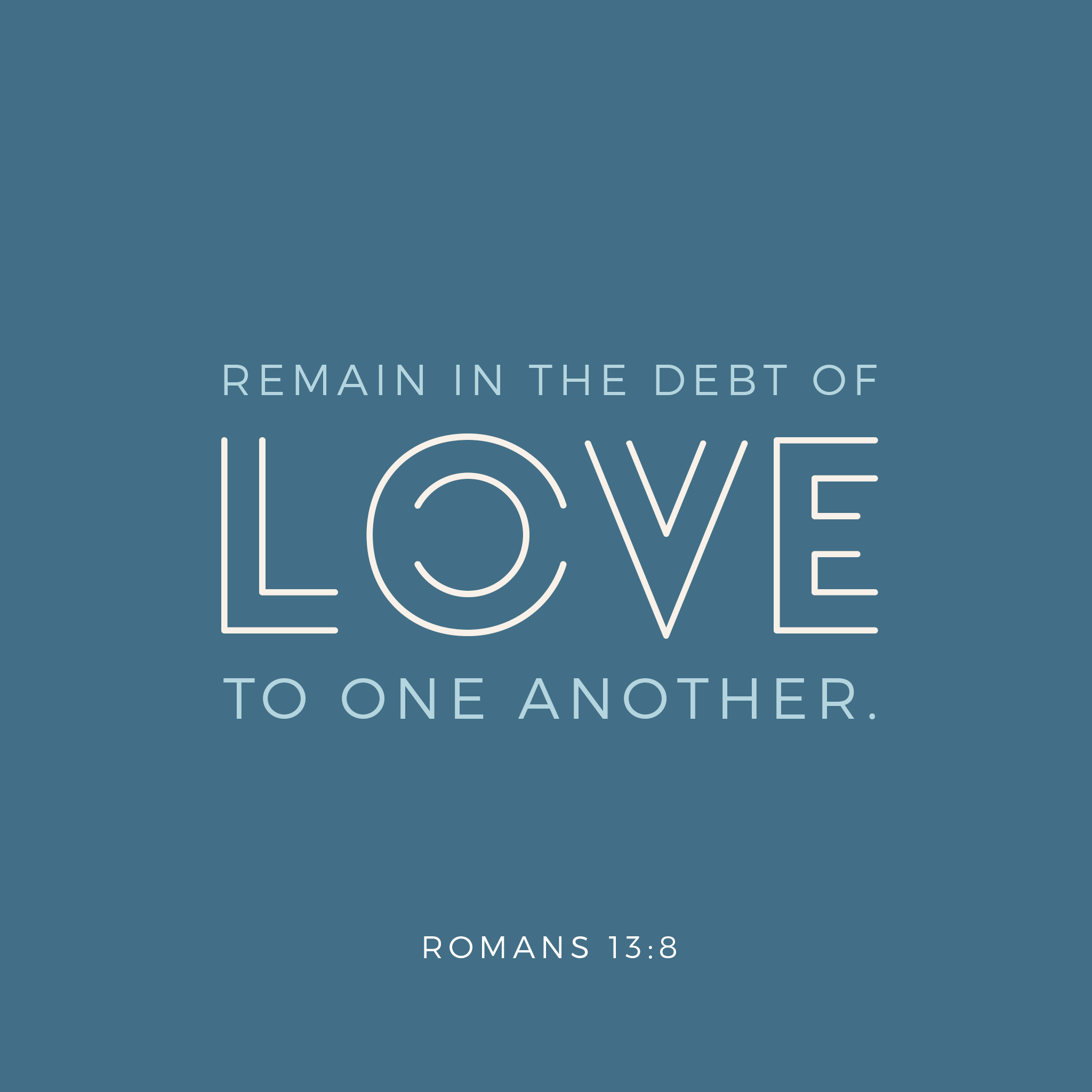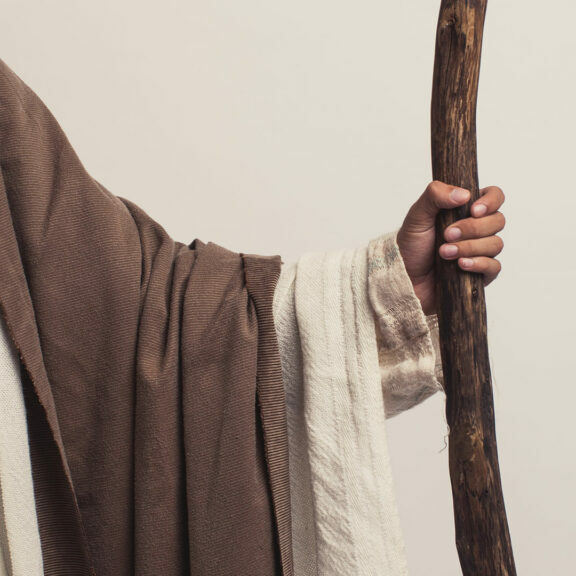September 20, 2020
Pastor Gunnar Ledermann
8 Let no debt remain outstanding, except the continuing debt to love one another, for whoever loves others has fulfilled the law. 9 The commandments, “You shall not commit adultery,” “You shall not murder,” “You shall not steal,” “You shall not covet,” and whatever other command there may be, are summed up in this one command: “Love your neighbor as yourself.” 10 Love does no harm to a neighbor. Therefore love is the fulfillment of the law.
Romans 13:8-10
This is a fire alarm. I took it out of my house because I got tired of it going off at random times and constantly beeping when the batteries get low. It just seemed better to live without all the hassle of the beeping and changing batteries, plus the statistics of actually having a fire in my home are so small that I am just going to get rid of all my fire alarms. NOT! Actually, this is not a fire alarm that I am holding in my hands, but a wireless internet booster. I would never want to get rid of the fire alarms in my home because they protect my family. And, the little beeps every now and then are something I can live with because they remind me to be prepared for a fire.
Fire alarms need to remain in your house, but debt is something you do not want in your life. As much as we can agree that fire alarms protect us and help us, we can agree that debt hurts. Debt is one of the major worries that we all share. Kids are worried that the debt of candy their parents owe them if they can’t go trick or treating will not be paid this year. College students fear and worry about student loan debt. Adults worry and struggle with credit card, car, home, vacation and student loan debt. Even in retirement, there is the worry of running out of money and going into debt just to try to survive. And, beyond the individual level, our government worries about debt. In order to keep the country from being overwhelmed by debt, the government spent trillions in stimulus checks due to the economic impact of the coronavirus. Yet, those stimulus checks upped the already staggering national debt of the United States to over 26 trillion dollars. Debt hurts so much because it means working to take care of our normal and expected bills, then working extra to pay off the debt, or it means living without something in order to come up with enough to pay off debt.
Our understanding that debt is bad is shared by Paul in our reading from Romans 13, except for one thing. Paul wrote, 8 “Let no debt remain outstanding,” which we would all agree with, but then he wrote, “except the continuing debt to love one another, for whoever loves others has fulfilled the law.” Paul agreed that debts need to be paid, but he wrote that there is one debt that is a blank check. The debt of love has no end, a debt Paul went on to explain as keeping the commandments. But, when we hear Paul explain that love means keeping the commandments, our sinful nature shouts, “NO! I am tired of commands and work, and I am tired of debts.” Paul wrote, 9 … “You shall not commit adultery,” but that takes work, and it is so much easier to give in to what feels good rather than wait for what is right, or to be with someone new rather than put the work into a relationship that has long passed the ‘honeymoon’ phase. “You shall not murder,” which is also to say do not hate or harm others according to 1 John 3:15, but it takes so much work to remain patient, to stop from saying that sarcastic, criticizing remark because someone failed at something, hurt me first or we think deserves it for being different. “You shall not steal,” when just a little time at the office on a personal call or getting paid for being on the clock at home while taking a nap seems so much better than working hard for 40, 50 or 60 plus hours a week. “You shall not covet,” when the bigger and better truck, house, boat, backpack, phone, paycheck is really what I want at any cost, rather than being content and thankful. Paul finished his definition of love by writing, “and whatever other command there may be, are summed up in this one command: “Love your neighbor as yourself.” Keeping the one debt of love as a blank check is a struggle. You and I struggle to love others because of our sinful nature. You and I struggle to keep God’s commands, to love others as we love ourselves, because, as Paul wrote earlier in Romans 8, the sinful mind 7 … “is hostile to God; it does not submit to God’s law, nor can it do so.” Our sinful hearts want to sign off on helping others and be paid up with loving, but if we go down that path of sin it only leads to death and hell. And, sin and death are debts you and I cannot repay.

Our only hope for our debt of sin to be paid off is Jesus. In his first letter, Peter wrote, “For you know that it was not with perishable things such as silver or gold that you were redeemed from the empty way of life handed down to you from your forefathers, but with the precious blood of Christ, a lamb without blemish or defect.” (1 Peter 1:18-19) You and I are not able to repay the debt of sin that we owe. If we try a little harder to love each day, we still cannot claim to have lived a completely perfect life of love as God demands. If we try to balance out the bad with the good, we are still left with a pile of bad things that have hurt ourselves and others. And, if we compare ourselves to others, we are no better “for all have sinned and fall short of the glory of God.” (Romans 3:23) Plus, God does not ask us to compare ourselves to one another. God asks us to compare ourselves to him; to be perfect as he is perfect. And, so Jesus, the Son of God, God himself had to be the one to pay our debt of sin with the payment of a life without sin. Jesus was the sacrifice of a life without sin, blemish, defect or hurtful thought, word or action. Jesus’ life bought us back with the riches of God’s grace as Paul wrote in Ephesians 1, 7 “In him we have redemption through his blood, the forgiveness of sins, in accordance with the riches of God’s grace 8 that he lavished on us.” Jesus’ life, death and resurrection are the overwhelming payment for sin. By God’s grace our debt was canceled, and our accounts have an overwhelming balance of goodness, righteousness, love and perfectly keeping all of God’s commands because God credits Jesus’ account, his life, to you. God’s love is the good news that God does not want anyone to be lost to sin, death and hell, and so he sent Jesus to save us.
You and I are called to share the good news of Jesus’ payment for our debt of sin. The love of God that saved us is now inside of us to share God’s love with others. In Ezekiel 33, we hear what God’s love desires for all people, 11 “Say to them, ‘As surely as I live, declares the Sovereign Lord, I take no pleasure in the death of the wicked, but rather that they turn from their ways and live. Turn! Turn from your evil ways! Why will you die, people of Israel?’” God does not want any of us to be lost. Instead, God wants all of us to turn from evil and live. In the verses before God makes it clear that he has given the task of telling one another about sin and its consequences. When you see someone sinning, you are called to warn them that sin leads to death, and to tell them about God’s grace through Jesus and his forgiveness that gives them eternal life. Do not let others remain ignorant of sin and its consequences. Some who hear you warn them may ignore you, but that is to their own condemnation. There will be others who hear you and are thankful that you showed them the consequences of their sin, and even more so, God’s work to save them from the consequences of sin. They will be thankful for God’s free grace and forgiveness through Jesus.
You and I have one outstanding debt to one another, the debt of love. Paul wrote this about the debt of love, 10 “Love does no harm to a neighbor. Therefore love is the fulfillment of the law.” Love is at the heart of God’s commandments. He created us to be good, and that description of good is clear in his commands to not murder, hate, hurt, commit adultery, cheat, steal, covet or be lost to greed and jealousy. There is a balance we live in as believers that our faith helps us to maintain. On the one hand, if we get unbalanced losing love, then the commandments become rigid laws turning us into prideful police and judges looking to corner and convict one another. On the other hand, if love is cut free from any commandments, then it easily dissolves into sentimentality and virtually any course of action can be defended as ‘loving.’ By faith, we live a balanced life loving one another within the boundaries of God’s good laws.
In Matthew 18, Jesus gave an example of loving one another within the boundaries of God’s law and revealed how this kind of love extends beyond this world and into the next. He said, 15 “If your brother or sister sins, go and point out their fault, just between the two of you. If they listen to you, you have won them over. 16 But if they will not listen, take one or two others along, so that ‘every matter may be established by the testimony of two or three witnesses.’ 17 If they still refuse to listen, tell it to the church; and if they refuse to listen even to the church, treat them as you would a pagan or a tax collector. 18 “Truly I tell you, whatever you bind on earth will be bound in heaven, and whatever you loose on earth will be loosed in heaven.” When you and I as believers bring up one another’s sins in order to keep us from falling away and to reveal the need for Jesus, we love one another. When you and I are the fire alarm that beeps exposing the danger of sin and when we point one another back to Jesus who gives forgiveness, peace, protection, guidance and eternal life. This is how we do what is good for each other and how we remain in debt; the debt of love to one another. Amen.



